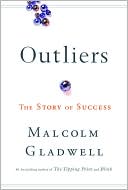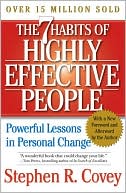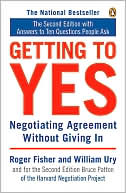Leading with Questions: How Leaders Find the Right Solutions By Knowing What to Ask
Praise for Leading with Questions\ "In Leading with Questions, Michael Marquardt maps the future of leadership. 'The leader of the past was a person who told,' Peter Drucker once said. 'The leader of the future will be a person who asks.' Read this book if you want to see the future."\ —Robert Kramer, director, executive education programs, American University\ "Through the rich stories of the organizational leaders who lead with questions, Marquardt offers a wonderful tool to enable...
Search in google:
In Leading with Questions, internationally acclaimed management consultant Michael Marquardt shows how you can learn to ask the powerful questions that will generate short-term results and long-term learning and success. Throughout the book, he demonstrates how effective leaders use questions to encourage participation and teamwork, foster outside-the-box thinking, empower others, build relationships with customers, solve problems, and much more. Based on interviews with twenty-two successful leaders who “lead with questions,” this important book reveals how to determine which questions will lead to solutions in today’s complicated business world.
Leading with Questions\ \ By Michael J. Marquardt \ John Wiley & Sons\ ISBN: 0-7879-7746-2 \ \ \ Chapter One\ AN UNDERUSED MANAGEMENT TOOL \ We live in a fast-paced, demanding, results-oriented world. New technologies place vast quantities of information at our fingertips in nanoseconds. We want problems solved instantly, results yesterday, answers immediately. We are exhorted to forget "ready, aim, fire" and to shoot now and shoot again. Leaders are expected to be decisive, bold, charismatic, and visionary-to know all the answers even before others have thought of the questions.\ Ironically, if we respond to these pressures-or believe the hype about visionary leaders so prominent in the business press-we risk sacrificing the very thing we need to lead effectively. When the people around us clamor for fast answers-sometimes any answer-we need to be able to resist the impulse to provide solutions and learn instead to ask questions. Most leaders are unaware of the amazing power of questions, how they can generate short-term results and long-term learning and success. The problem is that we feel that we are supposed to have answers, not questions. I interviewed leaders around the world about their use-or avoidance-of questions. This comment by Gidget Hopf, president and CEO of Association for the Blind and Visually Impaired-Goodwill Industries, is typical: "I just automatically assumed that if someone was at my door with a problem, they expected me to solve it." Hopf thought it was her job to provide answers. Then she realized that there was another way:\ Through coaching I realized how disempowering this is, and how much more effective I could be by posing the question back to the individual with the problem.... What I came to realize is that solving others' problems is exhausting. It is much more effective to provide the opportunity for them to solve their own problems.\ Unfortunately, from an early age, we are discouraged from asking questions, especially challenging ones, be it at home, school, or at church, as they are considered rude, inconsiderate, or intrusive. Thus we become fearful of asking any questions. As we ask fewer questions, we become ever less comfortable and competent in asking questions.\ And then when we become leaders, we feel that it is important for us to have answers rather than questions. Asking questions-or being unable to answer questions addressed to us-may show that we are somehow lacking as leaders. But this attitude leads to inertia. Consider what Jeff Carew, a vice president at Collectcorp, told me. "The easy way to lead, particularly if you are competent at your job, is to tell people how to do things in the way you have been successful." Usually, as Jeff has observed, people become successful either through a very capable boss who taught them the ropes or through their experiential learning that resulted in a successful track record and steady career advancement. Successful executives think they know the answers. "The problem with this is," Jeff noted, "if you do not create and maintain a working environment where you are always asking questions of your employees and forcing them to think, then you will probably never be any better tomorrow than you are today. Yesterday's solutions will not solve tomorrow's problems. I learned that you need to get to a different level of thinking if you are going to tackle tomorrow's problems-and who else is better to teach you how your environment is changing than the managers on the floor or in the trenches?"\ Like Jeff Carew, a growing number of leaders recognize that their organization's success, if not survival, depends upon creating a learning organization, an organization that is able to quickly adapt to the changing environment, where every engagement becomes a learning opportunity, where learning and business objectives are necessarily interlinked. The ability to ask questions goes hand in hand with the ability to learn. A learning organization is only possible if it has a culture that encourages questions.\ Do you ever feel defensive when people ask you questions? Do you ever hesitate to ask a question, fearing it may reveal ignorance or doubt? If so, you are closing off the free flow of information and ideas your organization needs and potentially undermining relationships with those around you. In fact, avoiding questions can cause serious harm, even disaster.\ What Happens When Leaders Do Not Ask Questions\ History is replete with tales of dire consequences experienced by leaders who did not ask questions. Recent disasters at the New York Times, Enron, and Arthur Anderson can be attributed to the lack of inquiring leaders. Historians who carefully examined the events and details behind the disasters of the Titanic, the Challenger, and the Bay of Pigs have determined a common thread-the inability or unwillingness of participants and leaders to raise questions about their concerns. Some group members were fearful that they were the only one who had a particular concern (when, in fact, it was later discovered that many people in the group had similar concerns). Others felt that their question had already been answered in the minds of other group members, and if they asked the question, it would be considered a dumb question; and they would be put down as being stupid or not going along with the group. Because people did not ask questions, people lost lives when the Titanic sank, when the Challenger crashed, when President Kennedy authorized a covert attack on the Bay of Pigs in Cuba.\ Sinking of the Titanic\ Why did the Titanic sink? When the luxury ship went down, on April 14, 1912, more than fourteen hundred passengers perished. Afterward, many questions were raised on both sides of the Atlantic. How could the allegedly unsinkable ship go down on its maiden voyage across the North Atlantic? What had gone wrong? Why couldn't the planner and builders have foreseen such a tragedy? Upon investigation, it was discovered that several of the planners and builders of the ship had indeed been concerned, though none of them had ever raised their concerns in the company of their colleagues. Why not? Because of their fear of appearing foolish by asking dumb questions. If no other "expert" seemed unsure about the structure and safety of the ship, then everything must be OK. Once the voyage was under way, many reports came in from nearby ships describing icebergs around them. "Titanic received many incoming messages warning of ice," Robert E. Mittelstaedt writes in Will Your Next Mistake Be Fatal? (2005, p. 101), "but there is no mention of her inquiring of others for updates or more information. What if someone was curious enough to ask for more information from the ships in the area?"\ The Explosion of the Challenger Spacecraft\ The spacecraft was launched on January 28, 1986, and exploded seventy-three seconds after liftoff. Much of the research into what went wrong with the Challenger launch focuses on the lack of communication between NASA, Morton Thiokol, Inc. (MTI) and the Marshall Space Center. MTI was the contractor responsible for the component that failed during the launch and depended on Marshall for the contract, and Marshall depended on NASA for funding and support. Almost two years before the fatal launch, MTI became aware that there could be a problem with the O-ring, a sealing component that prevents hot gases from escaping the solid rocket booster and burning a hole in the fuel tank (the physical cause of the Challenger disaster). The engineers at MTI documented this problem and insisted that further testing needed to be done to determine the reliability of the O-ring. Upon further testing they confirmed that the O-ring was not reliable, particularly when temperatures dropped below fifty-three degrees. Why then was the Challenger given the go to launch on January 28, 1986, when the temperature at launch time was thirty-six degrees, well below the safety margin? The people around the table were afraid to express their doubts or even to ask questions that they had determined before entering the room that morning that they would ask.\ The 1961 Bay of Pigs Invasion\ Fears of shattering the warm feelings of perceived unanimity-of rocking the boat-kept some of Kennedy's advisers from objecting to the Bay of Pigs plan before it was too late. "How could I have been so stupid?" President John F. Kennedy asked after the Bay of Pigs fiasco. What happened? In 1961, CIA and military leaders wanted to use Cuban exiles to overthrow Fidel Castro. After lengthy consideration among his top advisers, Kennedy approved a covert invasion. Advance press reports alerted Castro to the threat. More than fourteen hundred invaders arrived at the Bahia de Cochinos (Bay of Pigs) to find themselves vastly outnumbered. Lacking air support, necessary ammunition, and an escape route, nearly twelve hundred surrendered. Others died. Top CIA leaders blamed Kennedy for not authorizing vital air strikes. Other CIA analysts fault the wishful thinking that the invasion would stimulate an uprising among Cuba's populace and military. Planners assumed the invaders could simply fade into the mountains for guerilla operations. Trouble was, eighty miles of swampland separated the bay from the mountains. The list goes on. Groupthink was the term Irving Janis (1971) chose to use for the phenomenon: the kind of flawed group dynamics that lets bad ideas go unchallenged by questions and disagreement and can sometimes yield disastrous outcomes. Kennedy's top advisers were unwilling to challenge bad ideas because it might disturb perceived or desired group concurrence. Presidential adviser Arthur Schlesinger, for instance, presented serious objections to the invasion in a memorandum to the president, but suppressed his doubts at the team meetings. Attorney General Robert Kennedy privately admonished Schlesinger to support the president's decision to invade. At one crucial meeting, JFK called on each member for his vote for or against the invasion. Each member, that is, except Schlesinger-whom he knew to have serious concerns. Many members assumed other members agreed with the invasion plan. Schlesinger later lamented, "In the months after the Bay of Pigs I bitterly reproached myself for having kept so silent during those crucial discussions in the cabinet room." He continued, "I can only explain my failure to do more than raise a few timid questions by reporting that one's impulse to blow the whistle on this nonsense was simply undone by our inability to challenge one another and ask questions" (Janis, 1971, p. 76). After that huge blunder, JFK revamped his decision-making process to encourage questions, dissent, and critical evaluation among his team.\ Day-to-Day Disaster Prevention\ Questions and a questioning attitude are not just important for avoiding historic disasters: they are also useful day in and day out for giving feedback, problem solving, strategic planning, resolving conflicts, team building, and more. When we avoid questions, all these activities suffer, even if they don't lead to disasters of historic proportions. Consider what Cindy Stewart, president and CEO of the Family Health Council of Central Pennsylvania, told me:\ One of the first jobs that I had was in a sewing factory. My job title was "floor girl," which was the assistant to the "floor lady"-no kidding! This job entitled moving work from one process to another to assure that none of the workers in your section were without work, and that specific garment lots would be completed by the deliverable date. It was not considered a management position. I distinctly remember overhearing the management team discussing a particular bottleneck that routinely occurred with this one style of nightgown. As they wrestled with solutions, none of which worked, I can clearly recall that I was thinking, "I wish they would ask me." Since I was the one that worked the closest to the problematic process, I felt I was in the best position to solve the problem. Of course, they never did ask me.\ In avoiding questions, the management team at that sewing factory closed off a potentially important source of ideas and information, and their problem-solving ability suffered as a result. The experience left a lasting impression on Stewart.\ I think I made up my mind at that time that, if I were ever to be in a leadership position, I would never assume that having the title would mean that I had all the answers. Over my twenty-plus years in executive positions, I have come to realize that much of my success can be attributed to the fact that I believe in the capacity of the people who have worked with me. I truly think that the leader who tries to know it all and tells everyone what to do is doomed to failure.\ Facing Reality\ No company can become great, Jim Collins tells us in Good to Great, without the ability to confront the "brutal facts of reality" (2001, p. 88). Consider the story of the Boston Red Sox. The team's recent World Series win, as is well known, was long in coming. But in the 1940s the Red Sox was one of the dominant teams in baseball. Then in the 1950s the team went into a significant decline. One reason for the decline was attributed to racism. As other major league teams were widening their talent pools by recruiting black players, the Red Sox was slow to change. It passed on hiring Jackie Robinson and Willie Mays, and became the last major league team to recruit black players. Not until 1959 did a black player show up on the diamond in a Red Sox uniform. Prejudice played an obvious role. But reinforcing this prejudice was an unquestioning attitude. As Sidney Finkelstein writes in Why Smart Executives Fail, "Tom Yawkey, the owner of the Boston Red Sox, provides an all-too-typical example [of complacent prejudice]. When his scouts reported that African-American players were not good enough or simply not ready for big league play, he accepted their reports without question. Yet any serious attempt to verify these evaluations might have caused Yawkey to question his picture of baseball reality" (2003, p. 200). When leaders fail to ask questions, they forgo the opportunity to test their own assumptions and prejudices, whether those prejudices involve race or beliefs about consumer behavior, strategic threats, market conditions, product quality, staff abilities, or what have you.\ The failure to ask questions, in other words, allows us to operate with a distorted sense of reality. In fact, Finkelstein calls companies that are unable to question their prevailing view of reality zombies. A zombie company, he says, is "a walking corpse that just doesn't yet know that it's dead-because this company has created an insulated culture that systematically excludes any information that could contradict its reigning picture of reality" (2004, p. 25). But as GE's former CEO Jack Welch says, leading successfully means, "seeing the world the way it is, not the way we hope it will be or wish it to be" (Tichy, 2002, p. 64). Those responsible for the Bay of Pigs, the Challenger disaster, and the sinking of the Titanic were all operating under a distorted picture of reality because they failed to ask questions.\ Organizations and leaders that avoid questions are actually losing opportunities to learn, according to Noel Tichy. "This is not a trivial issue. Many executives close off learning. In their day-to-day interactions with staff they are usually either issuing instructions or making judgments about the ideas or performance of others" (2002, p. 60). By telling rather than asking, Tichy says, they are actually making their organizations dumber, "less smart, less aligned, and less energized every day." In such organizations, "there is little or no knowledge transfer, intelligence is assumed to reside at the top, and everyone below senior management is expected to check their brains at the door" (p. 53).\ Mike Parker, president and CEO of Dow Chemical, notes, "a lot of bad leadership comes from an inability or unwillingness to ask questions. I have watched talented people-people with much higher IQs than mine-who have failed as leaders. They can talk brilliantly, with a great breadth of knowledge, but they're not very good at asking questions. So while they know a lot at a high level, they don't know what's going on way down in the system. Sometimes they are afraid of asking dumb questions, but what they don't realize is that the dumbest questions can be very powerful. They can unlock a conversation" (2001, p. 37).\ Questions as the Ultimate Leadership Tool\ Oakley and Krug (1991) call questions the "ultimate empowerment tool" for the leader. They observe that the better we as leaders become at asking effective questions and listening for the answers to those questions, the more consistently we and the people with whom we work can accomplish mutually satisfying objectives, be empowered, reduce resistance, and create a willingness to pursue innovative change.\ (Continues...)\ \ \ \ \ Excerpted from Leading with Questions by Michael J. Marquardt Excerpted by permission.\ All rights reserved. No part of this excerpt may be reproduced or reprinted without permission in writing from the publisher.\ Excerpts are provided by Dial-A-Book Inc. solely for the personal use of visitors to this web site. \ \
1An underused management tool112Benefits of a questioning culture273Why we have trouble with questions514Asking the right questions635The art of asking questions776Creating a questioning culture977Using questions in managing people1158Using questions to build teams1339Using questions to shape strategy and enable change153Conclusion : becoming a questioning leader171Resource ATraining programs for questioning leaders175Resource BBiographies of leaders interviewed191








